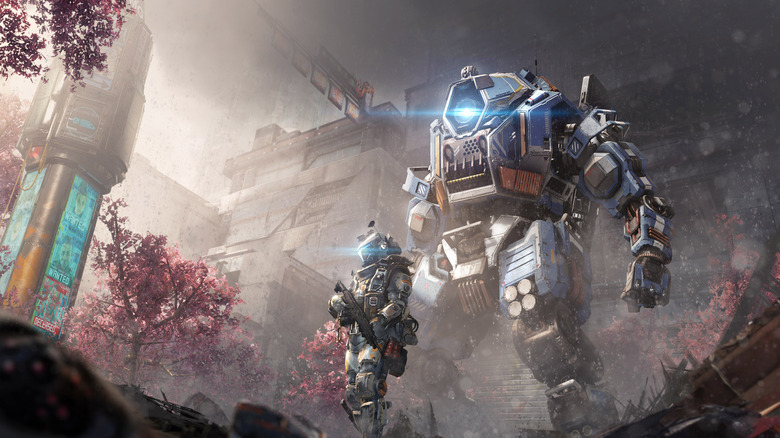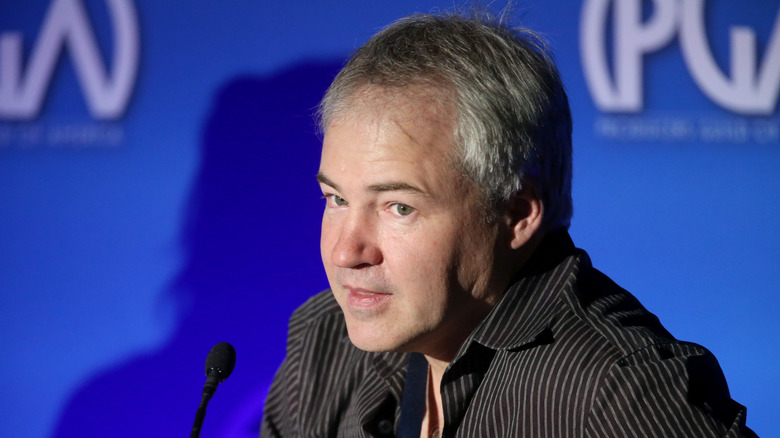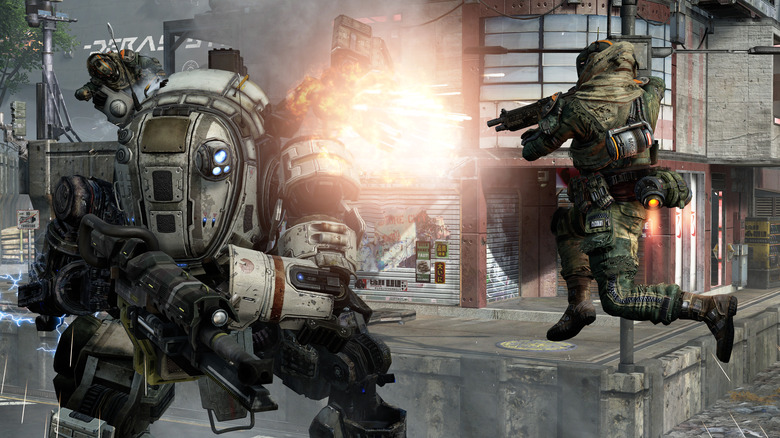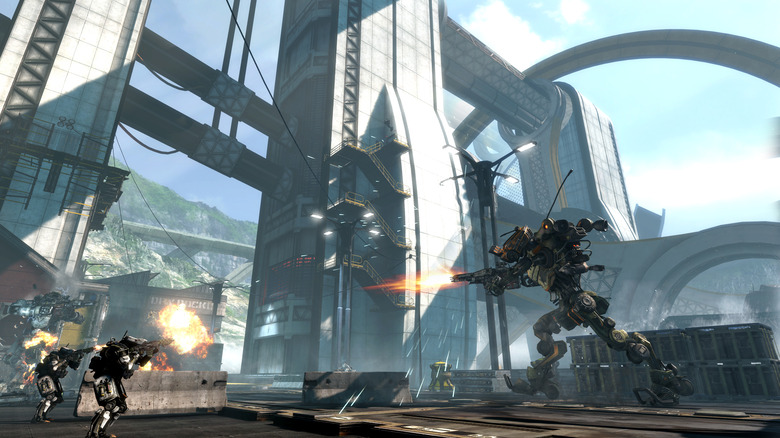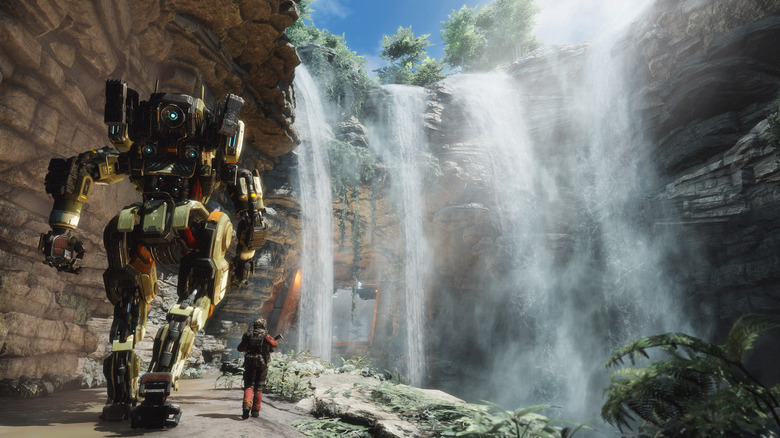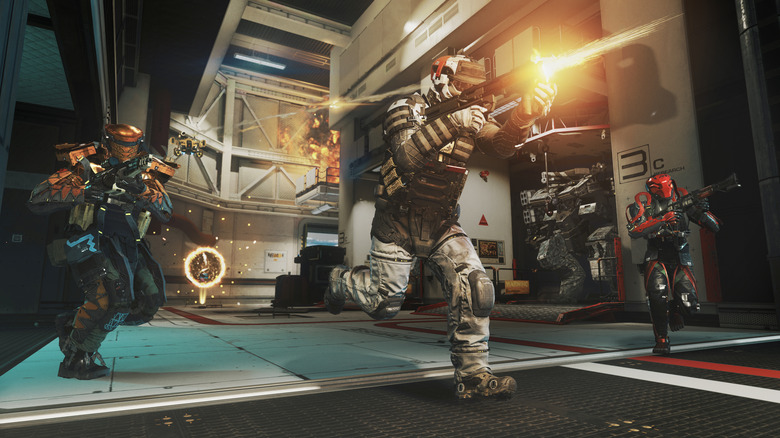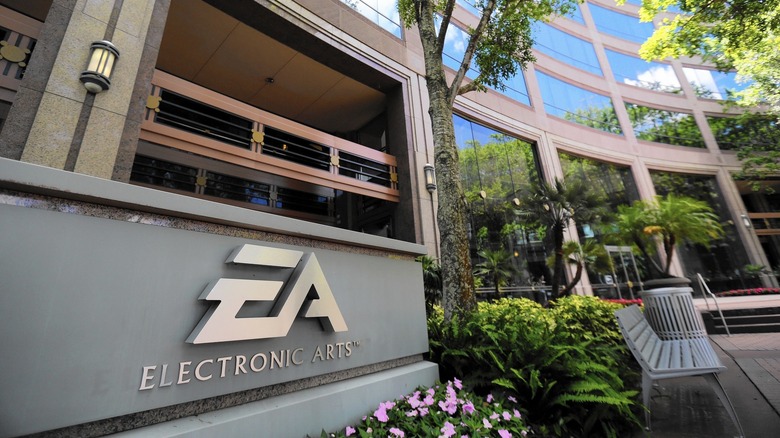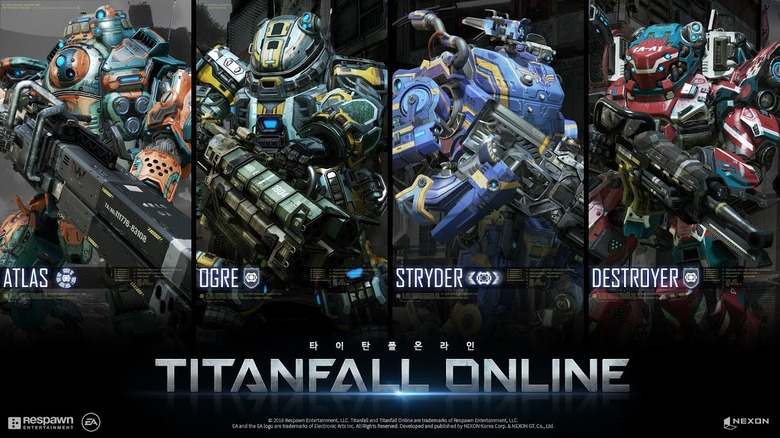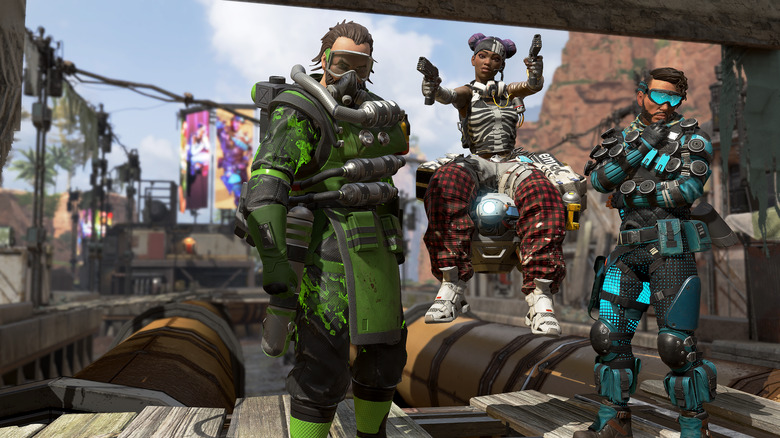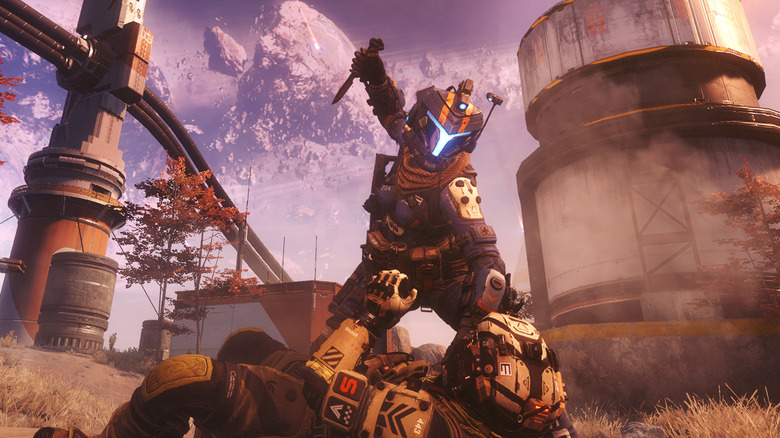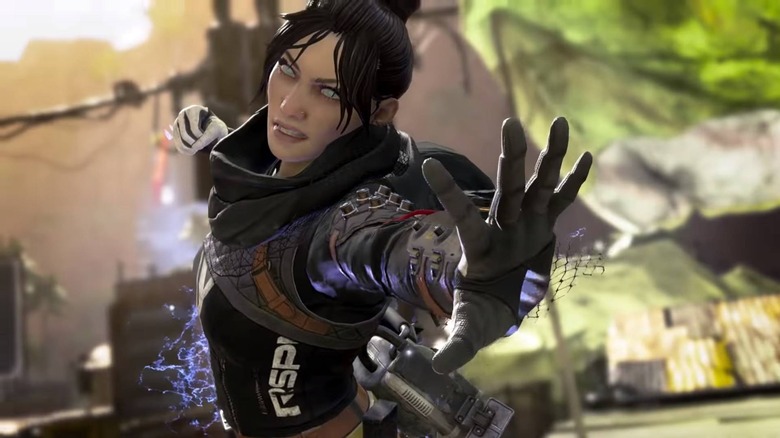The Untold Truth Of Titanfall
There have been first-person shooting games. There have been games with giant mech battles. But have you ever seen a game that combined those two concepts together and somehow, someway, made it work? That was the promise of the original Titanfall, and to Respawn Entertainment's credit, the studio delivered on it. That game spawned a larger, more ambitious sequel in Titanfall 2, and once again, Respawn absolutely killed it.
If both of those facts are true, then why isn't Respawn ever in the conversation about gaming's best development studios? The answer: because it hasn't always been smooth sailing for the Titanfall franchise. Bridges have been burned. Tough decisions have been made. Grudges have been long held. And Titanfall has been met with time constraints, fiscal realities, some occasional hubris, and finally, extraordinary fortune.
Below, we'll attempt to tell you the tale of Titanfall that few know — how this promising game series couldn't catch a break until it did, and how Respawn Entertainment was studio few could name until its name was everywhere. We'll explain where the first Titanfall went wrong. We'll fill you in on the decision that kept Titanfall 2 from selling like gangbusters. And we'll pause Apex Legends long enough to talk about how it is potentially keeping the Titanfall universe alive.
This is the untold truth of Titanfall.
A messy break-up with Activision
Before there was a Titanfall, and before there was a Respawn Entertainment, Vince Zampella and Jason West worked on a completely different first-person shooter franchise. As the heads of Infinity Ward, Zampella and West lead the team responsible for several Call of Duty games, including the original, Call of Duty 2, Call of Duty 4: Modern Warfare, and Call of Duty: Modern Warfare 2.
That is, until the pair was fired by Activision in 2010. Zampella and West wanted to work on a new IP. Activision, on the other hand, wanted another Call of Duty game. The firing lead to a lawsuit and a counter-suit that Activision eventually settled out of court.
With their freedom secured — and with some fatter pockets as a result of their victory over Activision — Zampella and West went on to found a brand new studio called (appropriately) Respawn Entertainment. The company quickly inked a publishing deal with EA (who Zampella and West had worked with previously on the Medal of Honor series) and got started on its very first project. That game, as we know today, was the original Titanfall.
The first Titanfall lacked a traditional campaign
In the political world, there exists this thing called spin: a way to make something sound positive regardless of how it actually looks. Respawn had to employ some of that when it first started showing off Titanfall to the world, as the game lacked the single-player campaign that so many had come to expect from the genre.
Respawn's Vince Zampella attempted to deflect concerns about the lack of a campaign, remarking that few players actually finish it, and that Respawn could make Titanfall's multiplayer modes better thanks to the added focus. But that wasn't the whole truth. Years later, Brent McLeod — the lead designer at Respawn — admitted that the studio simply didn't have the resources to add a single-player campaign to the original Titanfall. "We wanted to have a campaign in the first one, but there were a lot of constraints and timing restrictions that didn't allow us to do it," McLeod said.
There were some narrative threads to follow in the quasi-campaign Titanfall did have. It took place in a special multiplayer playlist that put players on either side of the game's conflict, letting them experience the story from one of two perspectives. But it wasn't the type of experience players were looking for, even if many did enjoy the work Respawn did on the multiplayer side of things.
Fortunately, fans would get their much-desired campaign later down the line.
Titanfall's servers are dealing with a hostage situation
The original Titanfall came out in 2014, and since then, we've gotten two more games from Respawn Entertainment: Titanfall 2 and Apex Legends. You'd think those would be enough for shooter fans who enjoy the Respawn formula, but it seems that the very first Titanfall still has a small but dedicated fan base keeping the servers alive.
But the internet, as it is wont to do, managed to provide a troll for those 50 or so Titanfall players on PC. And that put everyone's good time in peril.
According to VG247, a hacker somehow figured out a way to boot players from the game, doing so every time someone tried to log in for some multiplayer action. Numerous Titanfall-related message boards identified the specific user, and pleas went out for EA and Respawn to address the problem by either patching the game or banning the user from multiplayer. Unfortunately, despite the many complaints from players, it doesn't appear that either EA or Respawn have commented on the matter, or that either company has taken steps to stop Atomic Bomb from kicking people out of the game.
Titanfall 2 added a single-player, which was beloved
Titanfall felt great as a shooter, and introduced mechs to the genre in a novel and satisfying way. But just about everyone who played it felt that Titanfall had the potential to be something better, if only it had come packed with a single-player campaign. We know the scoop on that — Respawn just didn't have the manpower to include one in the first game. On the plus side, though, Respawn knew it had to go above and beyond with Titanfall 2 to really make the game shine.
The result: Respawn delivered what might be one of the greatest single-player campaigns ever seen in a first-person shooter.
Titanfall 2 starts out feeling incredibly familiar, as though Respawn took the traditional Call of Duty campaign formula and crammed Titanfall's giant mechs and gameplay mechanics into it. But the more you play, the more you realize that there's a whole lot of innovation contained within Titanfall 2's various missions. Platforming takes on a bigger role than it does in most shooters, asking players to navigate through an assembly line for prefabricated homes, defeating hostiles while leaping from moving object to moving object. And there's even a level that implements time travel in a way that totally catches you by surprise.
The campaign in Titanfall 2 won the game a whole lot of praise, and rightfully so. Unfortunately, it didn't quite light the sales charts on fire, and there's a reason why.
Respawn wanted a fight with Call of Duty
To this day, many fans of the Titanfall series are baffled as to why Titanfall 2 released when it did. The game came one week after Battlefield 1, another title published by EA. And it arrived one week before the next entry in the Call of Duty series. Both Battlefield and Call of Duty are long-running, hot-selling franchises. Both were almost certainly going to overshadow any game, no matter how good it was. So why, then, was Titanfall 2 sandwiched in between them?
The answer might have something to do with a grudge.
It's no secret that Respawn co-founder Vince Zampella left Activision under not-so-good terms. When he departed, he created his own studio and went right back to working in the first-person shooter space. And he also inked a publishing deal with EA, one of Activision's biggest competitors. According to Kotaku's Jason Schreier, when it came time to choose a release date for Titanfall 2, it was Respawn that chose to launch at that time, specifically "to go up against Call of Duty."
It appears Zampella felt good about Titanfall 2's chances to sock Call of Duty in the jaw. But it didn't work out that way, and as a result, Titanfall 2 got lost in the mix of fall video game releases.
EA acquired Respawn Entertainment in late 2017
Respawn Entertainment had the look of a game studio that would remain independent forever. Both Vince Zampella and Jason West had come from Activision, after all, and it was assumed that the two had grown tired of working for a large publisher. But West retired before the original Titanfall even saw the light of day. And then Titanfall 2 happened, and didn't quite perform the way everyone at EA and Respawn expected it to.
That's why it wasn't exactly a surprise when EA announced its acquisition of Respawn in November 2017. What was shocking, however, was the price tag. It's been reported that EA spent as much as $315 million in cash and stock, along with a $140 million bonus, to bring Respawn under the EA umbrella. And at the time, Vince Zampella stated that the acquisition wouldn't negatively affect the Titanfall franchise in any way. "For fans, my message is we are still Respawn and we are going to make things better," he said. "It doesn't change the future of Titanfall. Only positives come from it, like more resources."
Even knowing what we know today, we can't say for sure if that statement was true or not. It's possible we could find out sometime later in 2019.
An Asia-focused Titanfall Online was planned
It's not uncommon for some video games to target a very specific region. For instance, did you know that Microsoft was working on a unique, free-to-play version of Halo for Russia? Or that Destiny 2 in South Korea makes use of a completely different microtransaction system, and even offers up an entirely new character for selling in-game items? It seems that EA and Korean games company Nexon were looking into doing something similar with the Titanfall series by creating a spinoff game meant for Asian markets only.
Unfortunately, there wasn't enough interest in it, so EA and Nexon ultimately canceled the project in July 2018.
What would've been called Titanfall Online was meant as a way to engage Korean gamers with Titanfall's flavor of first-person shooting action. But the game just couldn't find an audience, as PlayerUnknown's Battlegrounds and Fortnite became increasingly popular. It's almost remarkable in a way: EA would end up getting a Titanfall-style online multiplayer game that would take the world by storm just a few months later. And maybe, just maybe, that's the real reason Titanfall Online got the ax.
In early 2019, Respawn became legend
At the start of the day on Feb. 4, 2019, most of the world was playing Fortnite: Battle Royale as usual. But by the end of the day, a whole lot of people were battling it out in a brand new battle royale game: Apex Legends, which launched at the conclusion of an hours-long live stream hosted by Respawn Entertainment.
It wasn't the Titanfall 3 many were hoping for, but it was still plenty good — and was at least set in the Titanfall universe.
Apex Legends took some tried-and-true ideas from the battle royale genre while adding fresh new takes on the formula. True to the studio's name, Respawn made bringing teammates back to life possible in Apex. The game also introduced a highly useful ping feature, which enabled players to point to items and make call-outs without the need for voice chat. Finally, Respawn made Apex more of a hero shooter, giving each character unique abilities and ultimates.
Some thought Apex Legends might be the next fad that would quickly die out, ceding the mountaintop once more to Fortnite. But the game has shown it has true staying power, and has only built a larger audience over time. And Respawn — a company that once appeared defeated — suddenly roared back, showing that the studio did, indeed, have what it took to make an extremely popular shooter.
The success of Apex Legends actually helped Titanfall 2
The massive success experienced by Apex Legends had some side effects. For starters, it dethroned Fortnite and made the game look for ways to capture some of that Apex magic. Next, it put the planned battle royale mode for EA's Battlefield 5 in an especially precarious position. It took a lot of attention away from another EA game – Anthem — that was only weeks away from launching. And finally, it put Respawn Entertainment on the map once more, giving players a reason to check out the studio's other games.
It was that last one that gave Titanfall 2's multiplayer servers a bump, either from those playing the game for the first time, or from lapsed fans returning for more Titanfall action.
Reddit users began sharing numbers shortly after Apex Legends launched that showed something incredible was happening. Titanfall 2, which averaged roughly 2,000 to 3,000 concurrent players on Xbox One, had suddenly become more popular. At one point, nearly 10,000 players were running around inside Titanfall 2, shooting Pilots and summoning Titans. Many feared that Apex Legends would signal the end of the Titanfall franchise as we know it. But now that Respawn has a little more cred to its name, the potential is there for a game more people will pay attention to later on down the road.
Respawn and EA have teased another Titanfall project
No, Titanfall 3 didn't happen. That third entry in the series wound up being Apex Legends, a game that's getting plenty of love in its own right. But there's no need to worry about the future of Titanfall, and we know that thanks to Respawn's Vince Zampella and EA's Andrew Wilson. We feel pretty good about the Zampella quote, and even better about the Andrew Wilson quote, because EA has never canceled anything, right? Right?
We kid. But we can remain at least somewhat confident that we'll see more Titanfall in the near term, because Respawn is actively working on another game in the franchise that isn't a direct sequel to Titanfall 2 but is still something.
"We are also working on more Titanfall for later in the year (yes, I said the T word)," tweeted Respawn's Vince Zampella the day after Apex Legends' launch. "We love being able to experiment in this crazy universe!"
Later in the month on an investor call, EA's Andrew Wilson added that a "truly creative take on what Titanfall is in a premium context" was being developed, but didn't add any other details about what that might be.
We're not quite sure what Respawn Entertainment is cooking up with regard to this mysterious Titanfall project that is not, in any way, shape or form, Titanfall 3. But we're anxious to get our hands on it.

